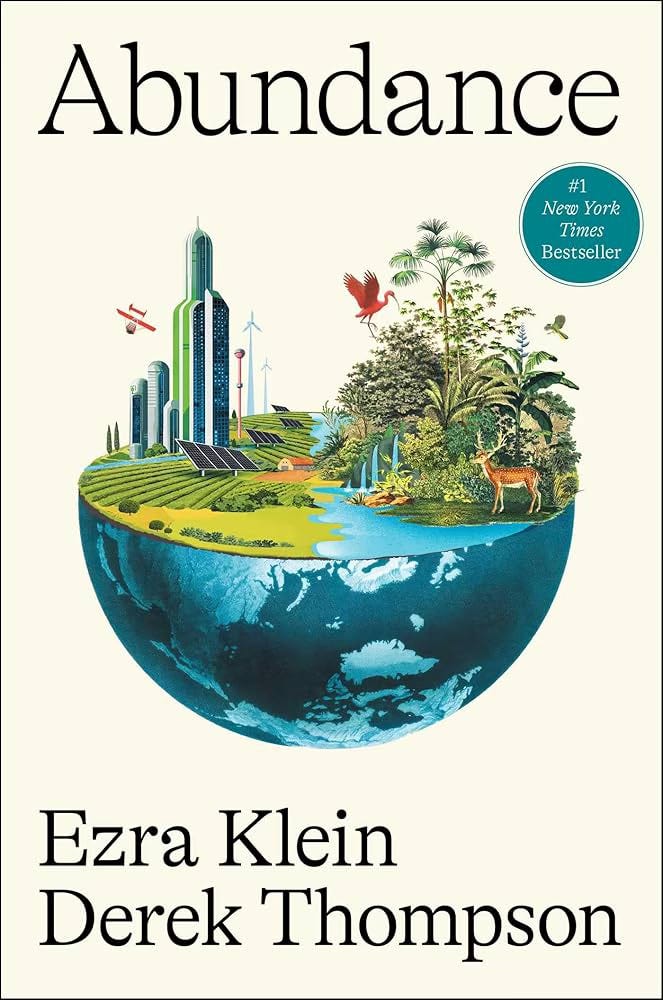Mindset: Titans Split, Texas Holds & Abundance Rises
A newsletter where carbon, technology, and values converge.
(Illustration by Javier Jaén)
Issue No. 153
Welcome to the latest Carbon Creed - where carbon, technology, and values converge.
In this issue we present the Mindset creed as a framework for decarbonization, applaud advanced energy wins in the Texas legislature, and deep-dive #1 New York Times Best Seller, Abundance, by Ezra Klein and Derek Thompson.
We hope you enjoy the discussion!
This week delivered a seismic shift in American clean energy politics: the very public fracturing of the Trump-Musk alliance over the House's sprawling spending bill. What started as a political partnership has devolved into a high-stakes battle, with clean energy subsidies serving as the fault line.
Musk's outrage centers on provisions in the “One Big Beautiful Bill” that would eliminate the $7,500 electric vehicle tax credit by year-end 2025 - a subsidy that has been instrumental to Tesla's mass market appeal. The bill goes further, slashing clean energy tax credits across the board and accelerating the repeal of manufacturing incentives that underpin Tesla's battery and energy storage operations.
For Musk's business empire, the financial implications are staggering. The legislation threatens to unravel the entire federal framework that transformed Tesla from Silicon Valley upstart to the world's most valuable automaker. Beyond consumer EV credits, the bill targets manufacturing incentives for battery production and renewable infrastructure - the backbone of Tesla's Powerwall, Megapack, and solar divisions.
The contradiction is striking: the world's wealthiest individual, who championed Trump's deregulatory agenda, now fights desperately to preserve the government subsidies that built his clean energy fortune.
If you have an opinion on any topic covered in this newsletter, please feel free to leave a comment below.
Thank you for your viewpoint and the value of your time.
Preamble
Mindset
“We are like tenant farmers chopping down the fence around our house for fuel when we should be using nature’s inexhaustible sources of energy - sun, wind, and tide.” - Thomas Edison
In my book The Carbon Creed, Mindset helps readers discern their orientation toward decarbonization —whether they identify more closely with the "Prophet," who urges restraint and conservation, or the "Wizard," who believes in technological innovation to address energy and ecological challenges. This introspective framework urges individuals and institutions to recognize the role of mindset in shaping policy, investment, and societal momentum. It argues that meaningful decarbonization begins not just with new technologies, but with a shift in how we perceive the future—embracing possibility over paralysis, and designing systems that reflect an abundance of ideas, tools, and willpower.
The Abundance narrative builds directly on this premise, arguing that winning the clean energy race is not just a matter of carbon emissions, but of constraint— artificial bottlenecks in permitting, regulation, and public imagination that prevent clean technologies from scaling. This lens spotlights the urgency of reforming energy regulation to allow innovation to flourish, pointing to places like Texas where competitive markets have enabled significant growth in wind, solar, and battery storage. Ultimately, how you see the world matters: the clean energy future will be won not just with better technology, but with a better mindset—one that dares to unlock abundance by aligning ethical clarity with institutional courage.
POLICY
This is Texas, Gonna Hold’em
The Texas Legislature's 89th session concluded on June 2, 2025, with a decisive victory for clean energy advocates. Multiple proposals by Texas lawmakers who aimed to restrict advanced energy use and development in the state failed to pass in the legislature, allowing numerous active and planned solar, wind and battery projects to continue unfettered. The most significant of these failed measures were three "anti-solar" bills, SB 819, SB 388 and SB 715 which had passed the Senate but died in the House after missing critical deadlines.
These bills would have created substantial obstacles for renewable energy development. The measures would have imposed "firming" requirements on renewable projects, new fees, permitting restrictions, onerous setbacks and regulatory burdens. The legislation represented a coordinated effort to slow Texas's renewable energy boom, but faced opposition from an unusual coalition that included both renewable and fossil fuel industry advocates.
The timing of this legislative defeat is particularly significant given Texas's rapidly growing energy demands. Advanced energy technologies offer compelling speed-to-market advantages that traditional power plants cannot match. Solar and wind installations can be deployed in months rather than years, providing Texas with the rapid capacity additions needed to meet soaring electricity demand from data centers, manufacturing, and population growth.
Furthermore, advanced energy technologies produce low-to-zero direct carbon emissions during operation, helping the state reduce its environmental impact while maintaining its leadership position in America's energy sector. Battery storage systems add grid reliability by providing instant response capabilities during peak demand periods, complementing the variable nature of wind and solar generation. With the anti-renewable bills now defeated, Texas can continue leveraging these technologies to build a more resilient, cost-effective, and sustainable energy infrastructure that supports the state's economic growth for years to come.
Walter’s Take:
Don’t mess with Texas…
The recent Texas legislative session and concurrent federal action present a striking study in contrasts regarding American energy policy. While the Texas Legislature's anti-renewable bills died in committee despite Republican control of both chambers, U.S. House Republicans successfully passed their sweeping "One Big Beautiful Bill" (H.R.1), which would eliminate crucial advanced energy tax credits that have driven solar, wind and battery expansion nationwide.
What makes the Texas outcome particularly significant is that it occurred under unified Republican control (including the Governor’s mansion) in a state long dominated by fossil fuel interests. The defeat of anti-renewable legislation demonstrates that economic pragmatism can overcome ideological opposition when lawmakers confront the reality of rapidly growing energy demand and the speed-to-market advantages that advanced energy provides. Texas faces a 5 percent annual growth in electricity demand, making the rapid deployment capabilities of solar and battery installations—which can come online in months rather than years—economically indispensable. This practical coalition of energy interests, including some traditional natural gas advocates, suggests that similar dynamics could emerge in the U.S. Senate, where Republican senators from states benefiting from clean energy development may resist wholesale elimination of federal incentives that support American energy dominance and economic competitiveness.
BOOKS
\
ABUNDANCE
By Ezra Klein and Derek Thompson
Ezra Klein and Derek Thompson's "Abundance" presents a compelling argument for reimagining America's approach to growth and prosperity in the 21st century. Klein and Thompson, drawing on their extensive backgrounds in political journalism and economic analysis, make the case that the United States has shifted from a nation built on abundance to one constrained by scarcity thinking. They argue that this transformation has fundamentally altered American politics, economics, and social dynamics, creating a zero-sum mentality that pits groups against each other rather than fostering collective prosperity.
The book's central thesis revolves around Klein and Thompson's observation that America's regulatory complexity, political polarization, and institutional dysfunction have created artificial scarcity in crucial areas like housing, energy, and infrastructure. The authors pay particular attention to how America's energy abundance – from cheap natural gas to vast renewable potential – remains largely untapped due to permitting delays and regulatory gridlock. They demonstrate how projects that should take months now take years or decades, citing examples of solar installations blocked by environmental reviews and transmission lines stalled by local opposition. Their analysis of the "vetocracy" – a system where numerous actors can block progress but few can actually drive it forward – offers a particularly insightful framework for understanding why American state capacity has seemingly diminished despite technological advancement.
Klein and Thompson's policy prescriptions focus heavily on unleashing America's technological and economic potential through institutional reform. They argue that the clean energy transition represents the greatest economic opportunity of the century, but only if America can build the necessary infrastructure at scale and speed. The authors advocate for streamlining permitting processes, reforming environmental review procedures, and restructuring governance to prioritize rapid deployment of renewable energy, advanced manufacturing, and digital infrastructure. Their concept of "supply-side progressivism" centers on the idea that technological abundance and economic growth can solve problems that redistribution alone cannot address. The book draws extensively on examples from the tech sector, showing how rapid innovation cycles and venture capital funding have created unprecedented wealth, while arguing that similar approaches could revolutionize energy, transportation, and manufacturing if regulatory barriers were removed.
Walter’s Take:
“Less is more,” or so it seems after reading this thought provoking book.
"Abundance" succeeds as both a diagnosis of American institutional sclerosis and a compelling vision for technological and economic renewal. Klein and Thompson's writing is characteristically clear and engaging, making complex discussions about energy policy, innovation economics, and growth theory accessible to general readers while maintaining analytical rigor. Their central insight – that America's greatest challenge isn't resource scarcity but institutional capacity – reframes debates about climate change, inequality, and competitiveness around the urgent need to build faster and better. While some may question whether their tech-optimistic approach adequately addresses labor displacement or environmental trade-offs, the book offers a valuable reframing of progressive politics that emphasizes empowerment through technological abundance rather than redistribution through managed decline. It's essential reading for anyone seeking to understand why America seems to have lost its capacity for the kind of rapid technological deployment that characterized previous eras of growth and innovation.
RESOURCES
Currents a podcast featuring in-depth discussions with experts on clean energy and finance, published by Norton Rose Fulbright.
Canary Media is an independent, nonprofit newsroom covering the transition to clean energy and solutions to the climate crisis






